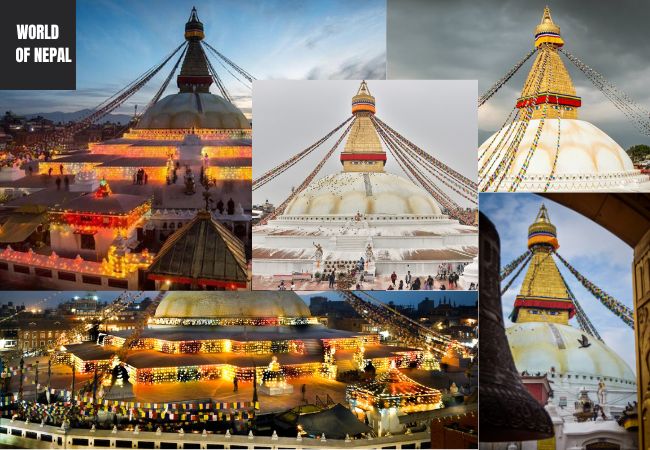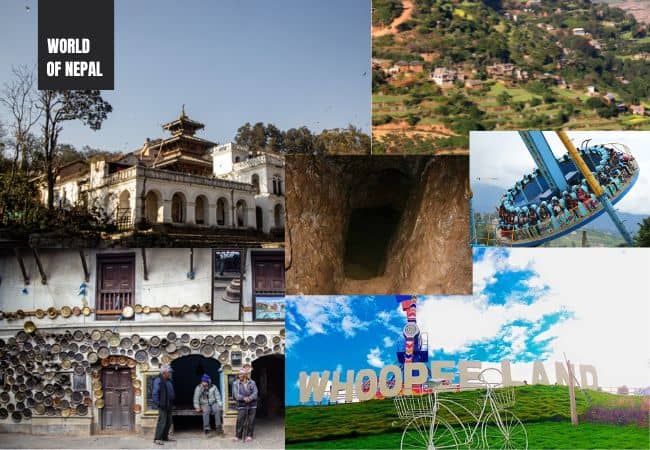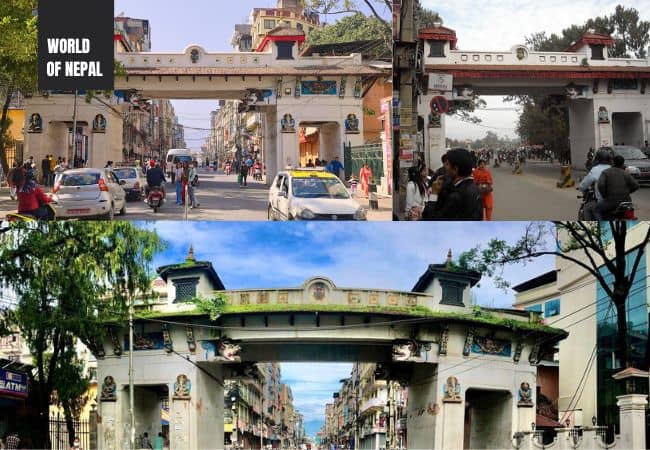15 Shocking Facts about Nepal Which You Might Not Know
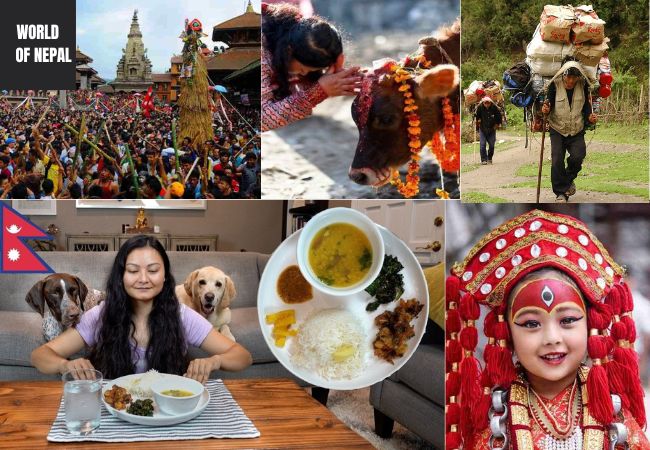
15 Shocking Facts about Nepal Which You Might Not Know: Nepal is a popular vacation spot for most travelers since it’s stunning, inexpensive, and has easy visa requirements. This little landlocked nation has a lot to offer first-time tourists, from breathtaking mountains to a unique and individual culture. Discover some surprising facts about Nepal as you continue reading.
- Kumari – Worshipping Little Girls as Living Goddesses.
- A National Flag which is not rectangular.
- The Nepalese calendar is 57 years ahead of the Gregorian Calendar.
- Sunday is a working day.
- Jutho or concept of impurity.
- Four ways of saying ‘You’
- Dal-Bhat for lunch and dinner.
Nepal National Flag
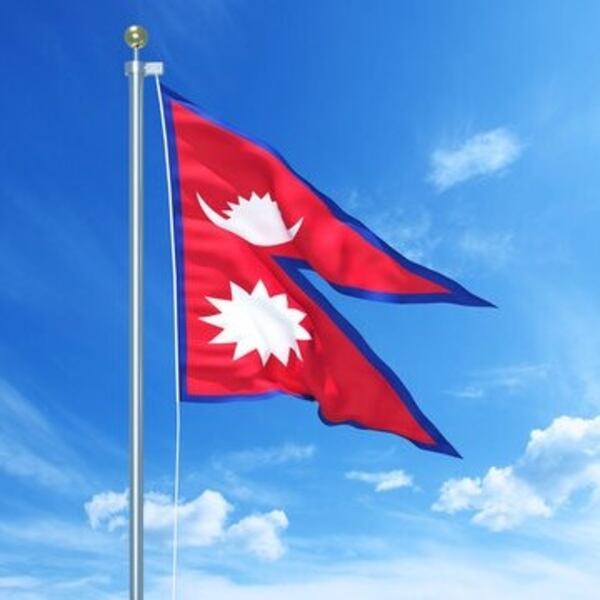
The only flag in the world that isn’t rectangular is the national flag of Nepal. The shape of the structure consists of two triangles, like a pagoda. The flag is red with a blue border, and it is embellished with the sun and moon. The color blue represents peace, while the color red represents the bravery of the Nepalese people.
National Animal
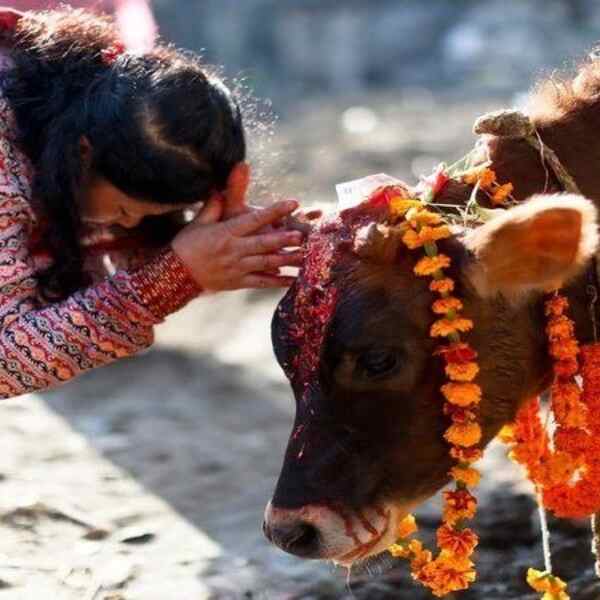
In Nepal, beef is not something that is easily found in stores or eateries. In the past, it was unlawful to sell or consume beef since cows are sacred to Hindus. But now that the nation is secular, individuals of different religions are allowed to eat beef as well. In Nepal, butchers who sell beef are still rare.
Nepali Calendar Data
In Nepal, they use the Bikrami or Bikram Sambat calendar. The solar calendar is 47 years ahead of the Western or Gregorian calendar. The current year in the Nepalese calendar is 2079, whereas it is 2022 in the Gregorian calendar. The Nepalese people could be said to be living in the future.
Living Goddesses -Kumari

Hindus believe that the bodies of prepubescent girls contain the goddess Durga. Young girls from the Newari community’s Shakya and Bajracharya castes are selected as Kumari, or Living Goddesses, in the Kathmandu Valley. They have priests and attendants in a unique home. They must welcome and bless devotees, conduct special pujas, and receive them.
Since their feet shouldn’t come into contact with the ground, attendants carry them everywhere they go. Each of the three valley towns—Kathmandu, Patan, and Bhaktapur—has its own Kumari, but the Kathmandu Kumari is considered the most significant Living Goddess.
Saying ‘You’ in the Nepali Language
In Nepali, there are four ways to say “you”: “hajur,” “tapai,” “timi,” and “ton.” Formal greetings for leaders, seniors, and friendships are “hajur” and “tapai.” ‘Timi’ is used among friends and peer groups. Informally, “ton” is used to refer to close friends, juniors, and those who are below you.
Sunday is a working day
In Nepal, Sunday is a working day and Saturday is a holiday. Since most foreigners are used to Sundays being holidays, they find this fact odd. Up until 2008, Nepal was a Hindu kingdom. Hindus believe Saturn, also known as Shani Dev, is the Hindu god of justice who rules Saturday, also known as Shanivar. Working on this day is considered unlucky since Shani might bring disaster if you are careless or have bad karma.
Lunch and Dinner
It is surprising to foreign visitors to Nepal that the people there can consume the same meal for 360 days out of the year, such as rice, lentil soup, curry, or dahl-bhat. For the majority of Nepalese living in the highlands, the carbohydrate-rich Dal-Bhat is the perfect diet. They put in a lot of effort from sunrise to sunset and depend on the belly-filling Dal-Bhat for an unlimited supply of vitality.
Hand for eating
It is usual to use your right hand when eating in Nepal if you are using your hands. Because the left hand is used for personal hygiene following a bathroom visit, it is considered impure.
Receiving gifts and other goods that are offered to you with your right hand is also considered to be respectful. You should utilize both of your hands or your right hand when extending something to other people.
Jutho or the concept of impurity
When visiting or living with a Nepali Hindu household, there are some food-related customs to keep in mind. Once you begin eating, you never share food on your plate. Sharing food from your plate after you’ve started eating is looked down upon and regarded impure unless you are close friends or relatives. The term “jutho” in Nepalese refers to impurity. To taste the dish, you should also avoid touching the ladles or serving spoons with your mouth. Drinking from a shared cup should be done so without placing your lips or mouth in contact with the lip.
Caste System
Hindus make up more than 80% of the population of Nepal. Hinduism holds that there are four caste systems or layers in society. Since the higher castes are thought to be superior to the lower castes, there is no such thing as equality. People continue to stick to the untouchability laws in isolated towns and villages, which forbid lower caste members from mingling with upper caste members.
Personal Questions used as ice-breakers
Even if you are a stranger, Nepalese people are friendly and enjoy beginning conversations with new people. Questions such as these are frequently thrown at foreign visitors:- Where do you live? What do you do? Are you married? How many children do you have? Where is your wife/husband? When are you planning to get married? What does your father/mother/husband/wife/children do? – while interacting with the locals.
It could be awkward, but this is how Nepalese people attempt to get to know you to become your “good friend.” They are sincerely curious about you and want to learn more about your life, which is why they ask these intimate inquiries. When they ask you these questions, they are not doing it with hate in their hearts.
Nepalese Porters
You are going to meet little porters who carry weights four or five times their weight when trekking in the highlands. Seeing a little person in flip-flops dragging heavy building equipment or home things up and down a mountain is stunning to a Westerner. More amazingly, they can outpace fit hikers with lightweight daypacks on difficult ascents.
Weird rules about PDA
PDA, or showing affection in public, is not acceptable in Nepalese culture. However, when two adults of the same sex (male or female) clasp hands or cover their arms around one another in public, nobody seems to mind. While it would draw glances of disapproval and curiosity from viewers, you can see mature men walking hand in hand down crowded streets with almost no one noticing.
Books are treated with reverence
A youngster in Nepal gets taught to respect books because they are our source of knowledge. It is not sitting upon, touched with a leg, or kicked. According to popular belief, books are home to Goddess Saraswati, the goddess of learning and information, and treating them disrespectfully makes one stupid and uneducated.
Gai Jatra -A unique festival where humor is celebrated
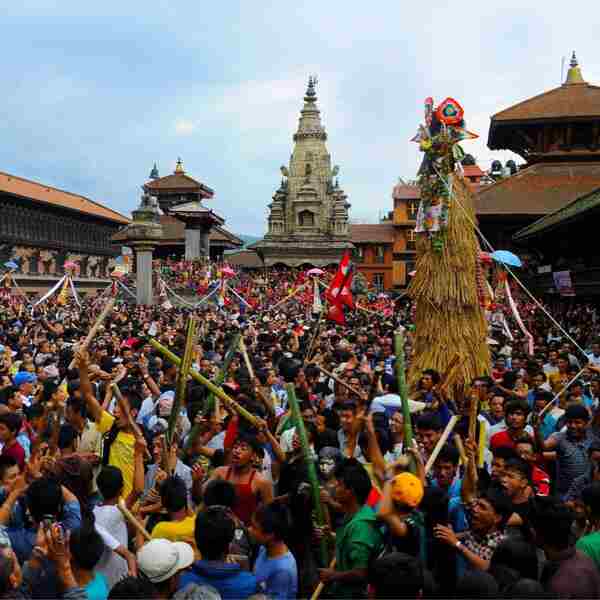
During the Gai Jatra event in Kathmandu, everyone is free to make fun of anyone. People at all ranks, from the President and Prime Minister to commoners, can be made fun of and lampooned without fear of insulting the person you are making fun of.
Additional: Nepal Government Has Decided To Ban PUBG Mobile And Free Fire In Nepal: Is This Real Or Not?
Yo, what’s up, guys?
Manjit Shrestha is here to drive you to a destination that you have never been to. In a country called Nepal🇳🇵”Mother and Motherland are greater than heaven”. Don’t forget to bookmark the site, and view our latest articles before you leave. Thank you for visiting our website World of Nepal, and being a part of our community. Stay strong, be positive, and share your voice with the world!✌️✌️



